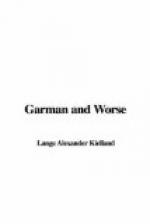And there, there was laughing, story-telling, drinking of healths, and rejoicing, until Pitter Nilken was quite overcome, and offered of his own accord to sing “The Knife-Grinder’s Courtship”—a song which had been a great favourite in the days of his youth. He sang amidst rounds of applause, in a curious thin voice, which sounded as if he had all at once recovered his boy’s treble, and which was high, squeaky, and cracked. He, however, rendered the air with a great deal of feeling, and his eye rested on Mrs. Worse as he sang—
“Maiden, oh list!
With those sweet winning glances,
Thy looks nought but
goodness and kindness betide!
Oh, couldst thou but
smile on my timid advances!
Say, wilt thou be thine
own knife-grinder’s bride?”
Mrs. Worse beat time with her knitting as she joined in the chorus—
“Whirr! whirr! Blithely we go. Never say no! My foot’s on the treadle, which rocks to and fro!”
CHAPTER XXVI.
In the bright sunshine the yellow sand, dotted here and there with patches of bent grass, stretched away to the northward as far as the eye could reach. The coast-line, with its succession of bays and promontories, was here and there enlivened by a cluster of boats, or a flock of gulls, or wild geese, busily at work on the shore, while the sea came curling in with its small crested ripples, which sparkled in the clear sunshine. Over the heather-covered heights, which rolled away far inland, came a carriage, in which were sitting a lady and a gentleman. They had left the post-road, and were making their way along the narrow sandy track which led down towards the village of Bratvold.
It had been much against Madeleine’s wish, but as her husband happened to hear from the coachman, that the detour only made a difference of about an hour, the order was given to drive down to Bratvold, where they would be able to rest for a little time on the road.
The pastor and his wife were on their way westward, on a visit to the new living, although they would not come into actual residence till August. They wished to take a house, and visit their relations and old acquaintances in the town. Pleased as Madeleine was at the prospect of again seeing her father, she was still far from glad when she heard that her husband was endeavouring to obtain the living. He did so, however, in accordance with the express wish of Bishop Sparre, and it was moreover looked upon as a great piece of advancement. Madeleine had, as usual, made but little opposition to the project. Pastor Martens had at length succeeded in educating her into a wife after his own heart.
As she sat there, somewhat crowded in one corner of the carriage, for her husband had grown rather stout with the lapse of time, she resembled but little that Madeleine whose home had once been among the surroundings they were now approaching. She was not ill, but her look suggested weariness—great weariness. In a large country rectory there is much work to be done, and three children are pretty well to begin with.




